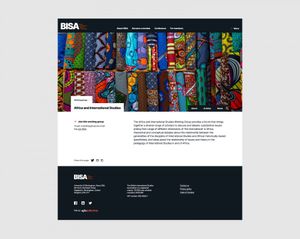British International Studies Association website
The British International Studies Association (BISA) is a UK-based academic membership organisation founded in 1975. Recognising that both academia and the field of international studies has changed dramatically since they began, BISA wanted their membership, events and strategy to reflect that.
The project was a transformational one – going beyond a refresh to a rebuild from the ground up. This included a bold new brand identity, redevelopment of their main site, and a complete overhaul of their content strategy, membership model and conference management system.

BISA branding
BISA had a clear organisational strategy and wanted a brand to match it. Their existing brand wasn’t doing much to support their strategic aims or reflect who they are as an organisation. Their visual identity wasn’t saying the right things to the right people.
To shift perceptions and reposition themselves as a leading voice in International Studies, a new visual identity needed to communicate that BISA is:
- Contemporary and forward looking
- Prestigious, expert and affordable
- Friendly and personal
- Collaborative and supportive
- Accessible, diverse and inclusive
You can read more about the brand development project here.


Working groups
As a membership association, It was essential that the site represented the range of topics, engagement opportunities and outputs that resulted from it. Working groups were at the core of BISA, but were not a part of their existing site. With over 29 groups active, a critical area of development was bringing these groups into the main site, showcasing their articles, events and news. This not only increased the visibility of content, but led to a single platform for event registration.

Conference management system
The BISA annual conference is a key event for the organisation with over 700 attendees in 2019 and over 150 panels, 400 papers and 50 roundtables submitted. The current system was bespoke and developed as part of their existing website. Rather than rebuild their existing system from scratch, BISA were eager to find a cost-effective, pre-existing solution that could meet their needs.
BISA’s conference requirements, however, presented a number of complexities (namely around the submission and creation of panels and roundtables) that weren’t met by existing subscription services or out-of-the-box solutions.
This led us to the python-based, open source conference management platform Indico; originally a CERN initiative that began over 10 years ago. While Indico didn’t meet all of the use cases for BISA, it provided a strong framework that we extended to meet BISA’s needs. As an open source system with a responsive and enthusiastic community, this solution also enabled us to develop and contribute to the ongoing development of Indico.

Membership
As with the conference system, BISA’s membership was managed through a bespoke system developed as part of their main site. Also similar to the existing conference management system, the membership management was both complex and limited in functionality – requiring many membership applications and payments to be manually run, or through loosely connected third-party systems.
BISA wanted to avoid another bespoke system and, again, were interested in an existing solution that required little customisation. To do this, we collaborated with Ed Kay from Tall Projects, a membership technology specialist, who guided us through the configuration and migration of BISA’s membership. Working with Ed and BISA, we reviewed a number of CRM solutions and felt that Sheep CRM best met BISA’s needs.
After consulting with BISA about the technical requirements however, it became clear that this was an opportunity to not only streamline their membership management, but also their membership model – making BISA a more inclusive and accessible organisation. By creating clearer membership tiers and benefits, while opening events up to non-members, the networking opportunities and visibility of BISA events has been greatly increased.

Main image (top): Priscilla Du Preez on Unsplash
